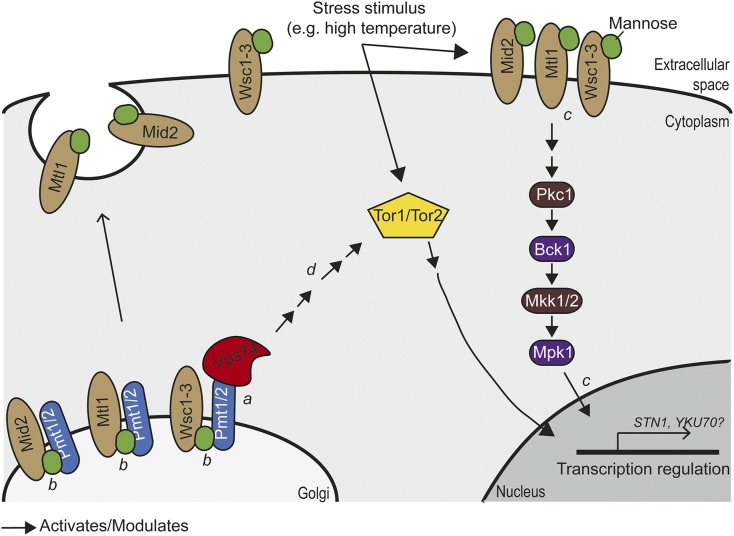Figure 7.
Speculative model for how Vps74 regulates stress responses through the Tor1/2 and Mtl1 pathways. Model for the possible role of Vps74 regulating gene transcription and protein levels in response to stress. (a) We suggest that Vps74 is important for the function of the mannosyltransferases Pmt1 and Pmt2 by helping recruit them to Golgi. (b) Pmt1 and Pmt2 mediate O-mannosylation of the transmembrane receptors Wsc1-3, Mid2 and Mtl1 (ketela et al. 1999; philip and levin 2001; lommel et al. 2004). Mannosylated Wsc1-3, Mid2 and Mtl1 are delivered to cytoplasmic membrane. (c) O-mannosylation of transmembrane receptors is important for proper activation of the Pkc1-Bck1-Mkk1/2-Mpk1 stress response cascade pathway Mtl1 (ketela et al. 1999; philip and levin 2001; lommel et al. 2004). The Pkc1-Bck1-Mkk1/2-Mpk1 cascade pathway promotes transcriptional changes and Mpk1 was shown to promote telomere silencing, transcription modulation and proteasome homeostasis (ai et al. 2002; jendretzki et al. 2011; lee et al. 2013; rousseau and bertolotti 2016). (d) Data from mammalian cells showed that GOLPH3 (Vps74 human ortholog) promotes mTor (Tor1/2 in yeast) activation (ai et al. 2002; scott et al. 2009; jendretzki et al. 2011; lee et al. 2013; rousseau and bertolotti 2016). The Tor pathway modulates gene transcription and protein translation in response to nutrient availability and cellular stresses.

